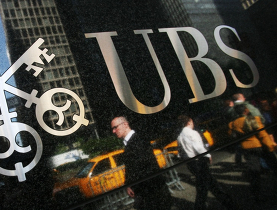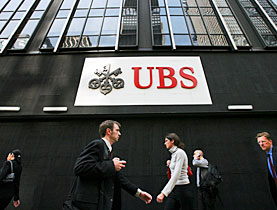UBS to stop offshore banking for US residents

Swiss bank UBS says it will no longer provide offshore banking and securities services to residents of the United States through its branches in Switzerland.
Testifying before a congressional hearing, Mark Branson, chief financial officer for UBS global wealth management and business banking, added that UBS was working with the US government to identify US clients who may have engaged in tax fraud.
Branson was one of two UBS executives who appeared before the Senate subcommittee in Washington on Thursday. The bank is being probed by the US tax authorities after a former employee admitted aiding tax evasion.
He said that while the bank was winding down the business of providing offshore banking and securities services to US residents, there would be “no new accounts opened”.
Branson also said client advisers based in Switzerland would not be allowed to travel to the United States “for the purpose of meeting” US clients.
He said UBS regretted “any compliance failures that may have occurred” and would now provide banking or security services to US citizens only through companies licensed in the United States.
The bank’s head of US wealth management, Martin Liechti, declined to give evidence.
Liechti has been forced to remain in the US for several weeks after being named as a material witness in an ongoing criminal court hearing involving a former employee, Bradley Birkenfeld.
Birkenfeld has already admitted to helping US clients evade taxes when he was employed by the bank. He has also accused UBS of “incentivising” him to undertake these activities and is cooperating with investigators.
Government assistance
A US federal judge ruled this month that the Internal Revenue Service (IRS), the federal tax-collection agency, could serve legal papers to UBS in an expanding probe of US taxpayers who may have used overseas accounts to hide assets and avoid taxes.
The IRS has also asked the Swiss government to help in its investigation.
Finance ministry spokesman Jean-Michel Treyvaud said Swiss tax authorities received the IRS’s official request for “administrative assistance” on Thursday.
He said the request would now be analysed, but had no further comments.
Loopholes
Senate investigators had accused UBS and a Liechtenstein bank of using the “cloak of banking secrecy laws” to help US citizens evade billions of dollars of tax. Their report estimated that the US treasury loses $100 billion a year (SFr101 billion) to tax cheats using foreign banks.
“Tax havens are engaged in economic warfare against the United States and the honest, hardworking American taxpayer is losing,” Senator Carl Levin, chairman of the permanent subcommittee, said.
“Today we will look at two banks that relied on secrecy and deception to hide not just the tax avoidance schemes of their clients but the actions they themselves took to facilitate US tax evasion.”
The report recommended a range of reforms, including stricter regulations governing foreign banks and harsher penalties for financial institutions that did not provide the US revenue services with details of the accounts held by US clients.
Senator Levin stopped short of accusing UBS of breaking the law, but said senior executives must have known the bank has been assisting clients to exploit loopholes.
One way was to advise clients to rearrange their assets to avoid having to reveal their activities or identities to the tax authorities under the terms of a 2001 banking agreement, the report concluded.
Thousands of accounts
“UBS allowed these clients to continue to maintain accounts in Switzerland, and helped them to reinvest in other types of assets that did not trigger reporting obligations to the IRS, despite evidence that the US clients were using the accounts to hide assets from the IRS,” the report found.
“UBS Swiss bankers targeted US clients, travelled across the country in search of wealthy individuals and aggressively marketed their services to US taxpayers who might otherwise never have opened Swiss accounts,” it added.
UBS has an estimated $18 billion in assets from 19,000 accounts held by US clients in Switzerland.
UBS would not comment on the Senate hearing until it has finished, but has always maintained that it is cooperating with the tax evasion investigations by the US authorities.
swissinfo with agencies
Former UBS employee Bradley Birkenfeld, a Liechtenstein national Mario Staggl and other “known and unknown” individuals were indicted for assisting tax evasion in May.
Birkenfeld initially denied the accusation, but changed his plea last month while providing prosecutors with details of his actions. He also said UBS had “incentivised” him to help clients evade tax.
In the meantime, the IRS and Department of Justice launched an investigation into the operations of UBS. Senior Swiss banking and government officials soon met the US authorities, but the details of the meeting were undisclosed.
Earlier this month, a Miami judge authorised a “John Doe” summons, ordering UBS to provide details of its US clients.
People wishing to dodge paying taxes on their assets can do so by three means: avoidance, evasion and fraud.
Avoidance is the legitimate means of structuring finances so they don’t fall under the scope of taxable assets. This can be done, for example, by setting up a trust fund or by changing country residence or nationality.
Evasion is the deliberate concealing of the true state of assets from the tax authorities – in other words, lying about the extent of your assets.
This is a civil offence in Switzerland and some other countries, such as Austria and Liechtenstein, but criminal in most states.
The main distinction between evasion and fraud is that the perpetrator tells lies on official documentation. This is sometimes known as “aggravated” tax evasion.
Unless tax fraud can be proved, Swiss banks are not obliged to hand over details of accounts and client assets to investigators.

In compliance with the JTI standards
More: SWI swissinfo.ch certified by the Journalism Trust Initiative











You can find an overview of ongoing debates with our journalists here . Please join us!
If you want to start a conversation about a topic raised in this article or want to report factual errors, email us at english@swissinfo.ch.